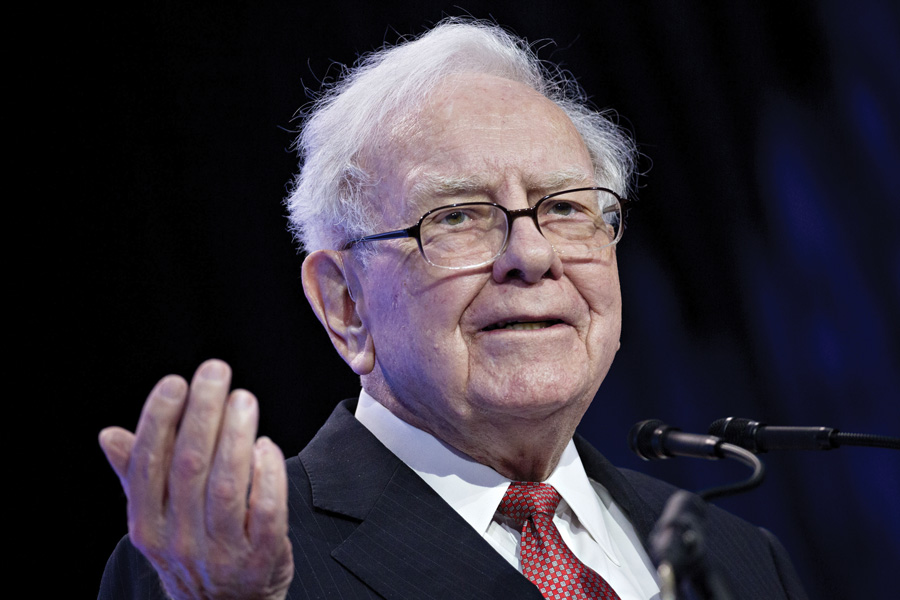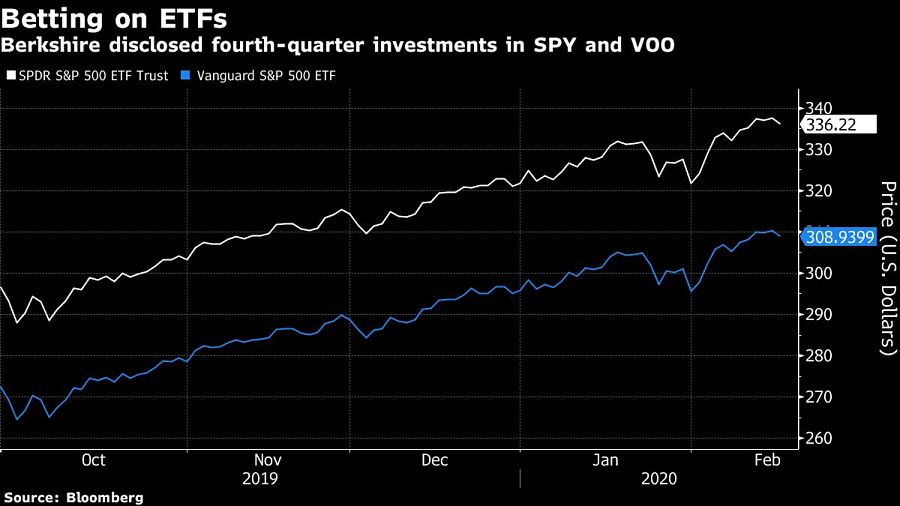

Legendary investor Warren Buffett’s Berkshire Hathaway Inc. just gave its blessing to the $4.6 trillion exchange-traded fund market — at least in one of its pension plans.
Berkshire added to the Vanguard S&P 500 ETF (VOO) and SPDR S&P 500 ETF Trus (SPY) in the final quarter of 2019, according to a regulatory filing. The relatively small investments, which totaled $25 million across both funds, are Berkshire’s only publicly disclosed ETF holdings in its most recent quarterly 13F filing. The investments are in a pension plan, according to Mr. Buffett’s assistant, Debbie Bosanek.
Mr. Buffett, whose Berkshire holds a record $128 billion in cash and U.S. Treasury bills, has been asked before about why he didn’t put the company’s unused cash into an index fund. The 89-year-old investor said last year at his annual shareholder meeting that he thinks Berkshire should have some cash available to deploy quickly if the chance to make a big acquisition arises, even though he’d rather own an index fund than Treasury bills.
Back in 2007, he argued that Berkshire’s stock picks could do better than the S&P 500 Index. Berkshire is set to release its annual letter to shareholders on Saturday.

The fourth-quarter addition is arguably the “ultimate endorsement” for ETFs and their different usages, said Bloomberg Intelligence’s Eric Balchunas. Large institutions will often park money in ETFs to keep exposure to the market while minimizing cash drag in their portfolios, he said, which is likely what Berkshire has started to do with its record cash pile.
“They use it almost as a temporary parking spot, and I think the liquidity is what they’re attracted to,” Mr. Balchunas said.
In that scenario, ETFs are essentially being used as an alternative for derivatives contracts, he said. He estimates that this manner of institutional usage accounts for roughly 5% to 10% of ETF assets.
Climbing cash pile
Berkshire has accumulated a stake of more than $71 billion in Apple Inc. in recent years and during the last three months of 2019, it purchased stock in Kroger Co. and Biogen Inc.
Still, Berkshire has failed to find a massive acquisition of a company to keep growing the conglomerate in recent years. That’s weighed on its stock, with the Class A shares increasing nearly 11% last year, short of the almost 29% gain in the S&P 500 during the same period.
In the meantime, Berkshire is likely using these ETFs as a liquidity way station of sorts, said Todd Rosenbluth, CFRA’s director of ETF research.
“SPY and VOO provide institutional investors the ability to stay in the market, while keeping their options open as they seek out individual stocks,” Mr. Rosenbluth said.

Relationships are key to our business but advisors are often slow to engage in specific activities designed to foster them.

Whichever path you go down, act now while you're still in control.

Pro-bitcoin professionals, however, say the cryptocurrency has ushered in change.

“LPL has evolved significantly over the last decade and still wants to scale up,” says one industry executive.

Survey findings from the Nationwide Retirement Institute offers pearls of planning wisdom from 60- to 65-year-olds, as well as insights into concerns.
Streamline your outreach with Aidentified's AI-driven solutions
This season’s market volatility: Positioning for rate relief, income growth and the AI rebound
